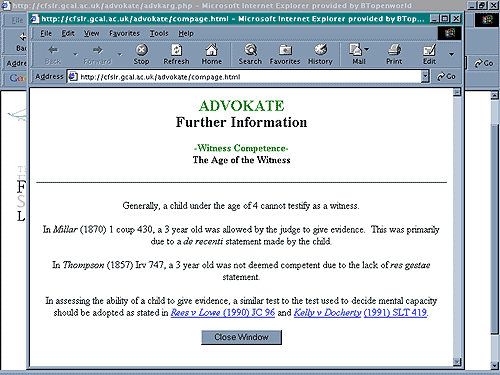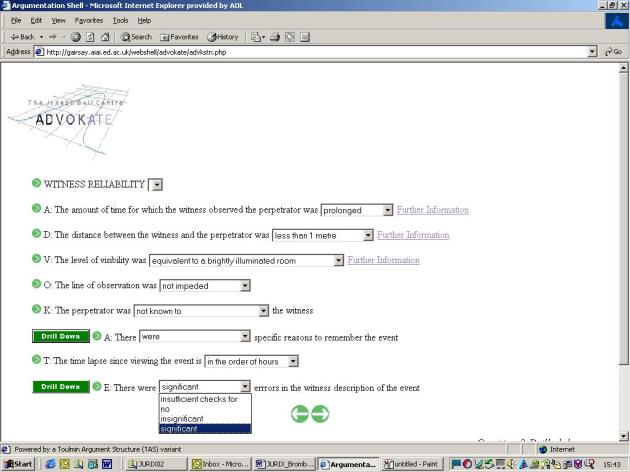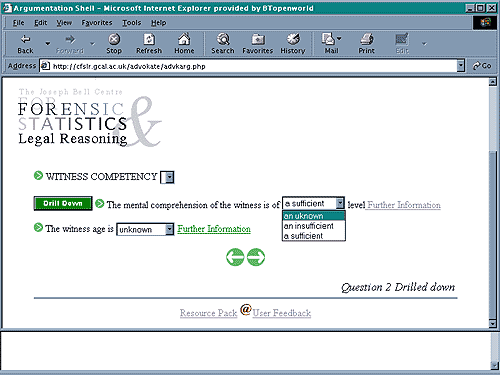ADVOKATE
ADVOKATE: a resource for learning the law of evidence
Michael Bromby (Glasgow Caledonian University), Moira MacMillan (Glasgow Caledonian University) and Patricia McKellar (University of Strathclyde)
This case study describes ADVOKATE, an expert advisory system designed to aid the police and legal practitioners in the assessment of eyewitness evidence. The system, which is freely available on the Internet, is being piloted as an educational tool by LLB students studying the law of evidence.
You are invited to provide feedback on the usability of the software and the knowledge content by using the prototype version. A resource pack containing a sample scenario and user guidance is available on the ADVOKATE website. Alternative scenarios may be developed to emphasise particular aspects of eyewitness evidence. There is a discussion area for comments, or e-mail the developers at m.bromby@gcal.ac.uk.
What is ADVOKATE?
ADVOKATE is an expert advisory system designed to aid the assessment of eyewitness evidence. Eyewitnesses are significant to a large percentage of criminal trials. The frequency and importance of eyewitnesses emphasises the need for reliable interpretation of their evidence. ADVOKATE is a generic prototype being developed by a consortium from Glasgow Caledonian University, the University of Edinburgh and the Lothian and Borders Police Forensic Laboratory.
What is an expert advisory system?
An expert advisory system is a computer application that contains knowledge gathered from research in a particular field. By asking relevant questions, an advisory system can combine the various input factors and provide an informed output. Advisory systems are limited in their scope of analysis; they are designed to aid, rather than replace, the decision maker. ADVOKATE is a support tool based on empirical research in the field of psychology, case law, domain expert opinions, statutes and authoritative legal texts, guidelines and reports. It is designed to highlight areas that may be overlooked by human analysis and to provide links to further information, thereby supporting the output.
What is being analysed in this tool?
ADVOKATE is designed to assess the compellability, competency and reliability of eyewitnesses. The user is required to respond to a number of statements, which can be completed by selecting one of a limited array of possible alternatives. Once all the relevant data has been inserted into the application it delivers guidance as to whether or not the witness is compellable, competent or reliable.
The legal rules which govern compellability and competency were easily modelled for incorporation into the program. To assess reliability artificial intelligence decision making tools were used to combine multiple factors. The factors stated in the case of R v Turnbull (1977) QB 224 have been used in the advisory system to represent reliability. Known as the Turnbull Rules, these factors form part of a mandatory warning by the judge to juries in England and Wales in cases involving eyewitness evidence.
For instance, the length of time the witness viewed the suspect is the first factor considered above. The application makes an assessment as to the reliability of a witness based on this length of time in conjunction with the remaining seven factors.
If the user cannot complete a statement, the system can generate a number of simplified statements which will assist in completing the initial statement. Within the system, this is known as drilling down, as the statement is considered at a deeper level. For example, in the first diagram below the mental comprehension of a witness may be entered as ‘unknown’, ‘insufficient’ or ‘sufficient’. If the user is uncertain as to how to complete the statement, rather than inserting ‘unknown’, which would suggest that the witness had not been assessed, the user may click on the green drill down button. This action lists the criteria required to assess sufficiency and assists the user in making the decision as shown in the second diagram.
The tree-like nature of the system allows a user to drill down at any given point to expand upon the initial statement. This can occur at any level of the tree, therefore several layers may be present with the basic concepts at the end leaves of the tree. Should the user be able to select an appropriate statement, he may proceed directly to the next stage without having to use the drill down facility.
 |
|
the deep level statements associated with the drill down for mental comprehension, as part of witness competency within Scots Law |
Who would use ADVOKATE?
ADVOKATE will be used primarily by those involved in the investigation and prosecution of crime. It is hoped that it could be adapted for use by a range of organisations within different jurisdictions, such as police forces, the prosecution services and defence agents. Further iterations may be tailored towards their individual needs to take account of different legal requirements. It is currently being piloted in Scotland with Crown Office trainees (the Scottish prosecution service) and undergraduate LLB students.
Why should it be used as a teaching tool?
Most simulations created for use in teaching replicate the real life environment. ADVOKATE was designed as a field tool, but with very little adaptation has proved to be a very effective and novel teaching tool. Although the teaching activity is hypothetical, in allowing the students to use the ADVOKATE software they are experiencing an application in exactly the same way as it would be used in the field. In addition, students are also being exposed to the substantive law of evidence. With the drive towards flexible learning, the system could become a very attractive self-contained computer-based learning tool.
How can ADVOKATE be used as a teaching tool?
We have developed a case study which has been piloted by undergraduate students learning the law of evidence. Students were presented with a scenario involving a fight outside a pub, and were required to read the statements of the accused and several witnesses. The witnesses each have certain pertinent characteristics or vantage points which highlight different elements of the Turnbull Rules or affect their competency or compellability to give their evidence in court.
|
Sample text from witness statements given to students Gordon Gray (37), 18 Station Road, Glasgow: I was driving past the ‘Rioter’s Arms’ as it’s on my delivery route. I was heading along West Street and about to turn right into South Street. There were a couple of guys having a square go. I saw the guy in a yellow jacket throw a punch and then get one back. The one in black really deserved it cos the other guy was going to set about him I reckon. I had a really good view as I was doing probably about 10mph, I’d just come round the corner and I must have seen a good few minute’s worth. The police officers came round to the depot to ask me what I’d seen a few hours later after I’d finished my shift that evening. |
Students translate the information into the application, drilling down where they are unsure of the answers, and are eventually provided with the resulting advice. Information can be explicit in the witness statement, or may be implicit from the scenario as a whole. In the example above, the line of observation may have been broken by traffic.
In a teaching environment, using the drill down facility provides structured reasoning to aid the student in understanding how decisions are reached and provides a justification for the result.
How has the application been adapted for educational use?
A ‘further information’ section has been associated with each statement. This provides a help system for users in the field, should they need support in completing a statement. For educational use, the further information pages were adapted and expanded to provide relevant additional material. If, for example, the student wants to know at what age a person can be a competent witness, he can click on the further information hyperlink adjacent to the statement (see the screenshots above). Help is also provided in the form of cases, principles and references see screenshot below). While this has been included for educational use, it has been revealed as a valuable resource for those using the tool in the field during the pilot studies.
 |
|
further information hyperlinks lead to brief summaries and links to external sources such as legal cases |
How is this different to a traditional computer-based learning system?
As the system was developed as a field tool, there are no in-built scenarios. There are therefore no right or wrong answers, as commonly found in other educational tools. In pilot studies, the students had an expectation that if they answered incorrectly this would be pointed out by the application and another opportunity to answer would be given, perhaps with feedback on the incorrect response. Again this points to the ‘real’ nature of the use of ADVOKATE in education. Students soon realise that when working in the field they will not be prompted with the right or wrong answer and will be required to make reasoned decisions of their own.
What has been the student reaction?
The project has been evaluated through the use of student questionnaires, discussions with module leaders and observation. Feedback on the use of ADVOKATE as an educational tool was favourable, as indicated below. Students also indicated an increase in their substantive knowledge, both in the questionnaires and during the pilot study. Not surprisingly, most students did not see this as a replacement for lectures but as an additional support tool to complement teaching, which was the initial aim of the project.
|
Analysis of responses from undergraduate law students Did you find assessing eyewitness evidence with the program helpful?
Did you improve your knowledge of witness competency and compellability? – 89% yes Would you like to see ADVOKATE or a similar program:
Student comments:
|
Can ADVOKATE be used as a means of assessment?
ADVOKATE can be used as an independent student-based learning exercise. Feedback from the pilot studies and the questionnaires suggested that all students saw a project-based assessment as a useful way of introducing the application into the assessment regime. Assessment could take the form of a portfolio of documents relating to the scenario, together with a student report. Real time assessment is not possible due to the nature of the field too – there are no in-built scenarios.

